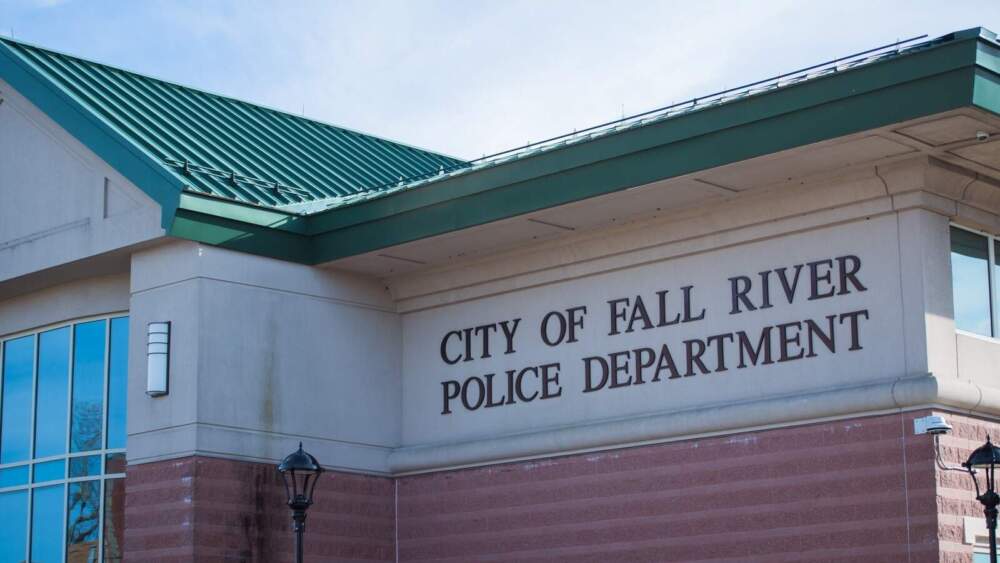Advertisement
Jury finds Fall River cop guilty of covering up police station beating

A jury convicted a Fall River police officer on Thursday of using excessive force during an arrest and filing false reports to cover up what happened.
Nicholas M. Hoar, a policeman with a long record of violent incidents during his four years of active duty, including a fatal police shooting in 2017, was found guilty of striking a suspect on the head with a steel baton, opening up a gash that required five stitches to close.
At the time, Hoar filed reports claiming he pushed the suspect in self-defense, causing him to fall and hit his head accidentally on a wall. After three days of oral arguments and witness testimony in the U.S. District Court in Boston, the jury found Hoar’s account to be false.
Hoar, who has been suspended from the Fall River Police Department since the incident took place in 2020, is scheduled to return to court on April 29 for a sentencing hearing before Judge Allison D. Burroughs. There is no minimum jail sentence for his convictions. The maximum sentence for the excessive force charge is 10 years in prison; the maximum for the charges of filing false reports is 20 years.
Judge Burroughs did not order Hoar to be held in custody while awaiting sentencing.
Hoar’s conviction marks the second time in eight months that a Fall River police officer has been found guilty of covering up excessive force with false reports. The conviction could also tip the balance in a lawsuit filed against Hoar and the City of Fall River four years ago, which alleges Hoar filed false reports to avoid punishment for fatally shooting a teenager while breaking up a car race in 2017.
This week’s criminal trial concerned an incident that unfolded inside the Fall River Police Station in December 2020, as four police officers moved an uncooperative domestic violence suspect named William Harvey into a holding cell.
There is no video footage documenting what happened inside the cell. While the police station has an extensive surveillance system, the camera inside the cell where Harvey was injured provided real-time monitoring but did not record footage, according to testimony from Fall River Police Officer Jeffrey Maher.
Prosecutors relied on Maher — pronounced “mayor” — as a star witness who could break through what they called the “blue wall of silence.”
Maher initially filed a report claiming the glare on the cell’s transparent door prevented him from seeing what happened to Harvey.
Maher said he was the last of the four police officers to file a report about the incident. He said officers Brendan McNerney and Zachary Vorce had already corroborated Hoar’s account, which made it difficult for him to tell the truth.
“It would be a very bad position for all of us,” Maher said, “and they were brand new officers — good officers — and to save their reputation and their jobs, I lied.”
Federal prosecutor John J. Reynolds III said Maher also lied out of a sense of loyalty to Nicholas Hoar’s father.
Hoar and his brother, J.T. Hoar, are the fifth generation in their family to serve as police officers in Fall River. Their father, Michael Hoar, also served as the chief of staff to former mayor Jasiel Correia after retiring from the police department.
Maher provided the trial’s only piece of eyewitness testimony about Nicholas Hoar striking Harvey on the head with a baton.
Harvey, Maher said, had kicked Hoar moments before the baton strike. But Maher testified that he and the other police officers still had the situation under control.
“Harvey was in the cell, Hoar was outside the cell,” Maher said. “They were engaged in this verbal back and forth. All he had to do was slide the door shut.”
Instead, Maher said, Hoar grabbed another officer’s baton and walked into the cell to strike Harvey on the head.
Maher said the impact of the baton strike on Harvey’s head sounded like “an aluminum bat hitting a baseball.”
Prosecutors called on several of Hoar’s superiors to testify about the department’s use of force policies, which prohibit baton strikes to a person’s head unless an officer is facing death or serious bodily harm.
Hoar received this training at the police academy, in annual use of force trainings at the police station, and at a more specialized de-escalation course he took the month before Harvey’s arrest.
Fall River Police Lt. David Gouveia, who administers the annual training at the city’s police station, said he uses a phrase to teach officers not to use the baton on “red zones” like the head, except in potentially fatal situations.
The phrase, Gouveia said, was “head, red, dead.”
Medical records from Charlton Memorial Hospital, where Harvey was transported by police partway through the booking process, were entered into the record as evidence. The doctor that treated him wrote that Harvey suffered a “forehead laceration” from a strike to the head.
Harvey’s booking photo, which shows blood trickling down his forehead, was taken after he returned from the hospital with his wound stitched.
The defense called no witnesses during the trial, and Hoar did not speak in open court. His few statements in the courtroom were made in hushed tones to his defense attorney, Leonardo Angiulo. Officers McNerney and Vorce, who remain on active duty with the Fall River Police Department, never testified.
Harvey, the victim at the center of the case, was never called to testify either. He did not attend the trial.
The Public’s Radio in Rhode Island and WBUR have a partnership in which the news organizations collaborate and share stories. This story was originally published by The Public's Radio.